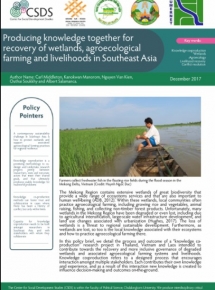Producing work together for recovery of wetlands, agroecological farming and livelihoods in Southeast Asia
The Mekong Region contains extensive wetlands of great biodiversity that provide a wide range of ecosystems services and that are also important to human well-being. Within these wetlands, local communities often practice agroecological farming, including growing rice and vegetables, animal raising, fishing, and collecting non-timber forest products. Unfortunately, many wetlands in the Mekong Region have been degraded or even lost, including due to agricultural intensification, large-scale water infrastructure development, and land use changes associated with urbanization. The loss of wetlands is a threat to regional sustainable development. Furthermore, as wetlands are lost, so too is the local knowledge associated with their ecosystems and how to practice agroecological farming there.
In this policy brief, we detail the process and outcome of a “knowledge co-production” research project in Thailand, Vietnam and Laos intended to contribute towards the recovery and more inclusive governance of degraded wetlands and associated agroecological farming systems and livelihoods. Knowledge co-production refers to a designed process that encourages interaction amongst multiple stakeholders. Each contributes their own knowledge and experience, and as a result of this interaction new knowledge is created to influence decision-making and outcomes on-the-ground.
Author(s)
Albert Salamanca
Van Kien Nguyen
Kanokwan Manorom
Carl Middleton
Outhai Soukkhy
Published
2017

 Read more about SUMERNET
Read more about SUMERNET
